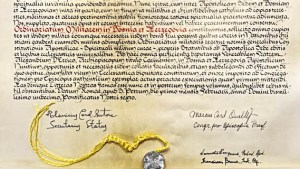In his closing address to those participating in the Synod on Synodality on October 26, 2024, Pope Francis announced that he would not publish a post-synodal apostolic exhortation, but would sign the final document produced by the 356 voting members of the Synod, thus integrating it directly into his magisterium.
“In light of what has emerged from the synodal journey, there are and there will be decisions to be made,” he announced at the end of this major project he launched three years ago.
Early in the evening of October 26, in the Paul VI audience hall, the 356 members of the Synod finished voting on the 155 paragraphs of the final document. Shortly after the vote, in his concluding address, the Pontiff announced that he would not publish a post-synodal apostolic exhortation, a rare decision.
“There are already highly concrete indications in the Document that can be a guide for the mission of the Churches, in their specific continents and contexts. This is why I am making it immediately available to everyone,” he said.
At least one precedent
A document being immediately “approved” by a Pope – and thus forming part of his ordinary magisterium – is envisaged in the Apostolic Constitution Episcopalis communio.
It has at least one precedent — during the second Synod, which was held in Rome between September 30 and November 6, 1971, and was devoted to the ministerial priesthood and justice in the world.
Pope Paul VI incorporated the final document into his ministry.
More commonly, at the end of a Synod, the pontiffs draw up a text based on the reflections raised by the synod fathers: an exhortation with a set of encouragements and recommendations.
Examples of these documents include Verbum Domini, Benedict XVI’s 2010 post-synodal apostolic exhortation following the synod on the Word of God.
Or John Paul II’s Familiaris Consortio, following the 1980 synod on the family and the two previous ones on related themes.
In announcing that there would be no post-synodal papal document, Francis said, “I wish to recognize the value of the synodal journey accomplished, which by means of this Document I hand over to the holy faithful people of God.”
He highlighted as well that the 10 working groups that he had created to focus on specific themes will continue to “work with freedom” until June 2025.
Similarly on certain subjects included within the document, he said “more time is needed in order to arrive at decisions that involve the whole Church.”
“This is not the classic way of postponing decisions indefinitely,” he assured. “It is the way that corresponds to the synodal style with which even the Petrine ministry is to be exercised: by listening, convening, discerning, deciding and evaluating.”
Don’t tie God’s hands
“It is harmful when women and men of the Church erect walls. Everyone is invited in!” Pope Francis also emphasized in his speech. “We must not behave as ‘dispensers of grace’ who appropriate the treasure by tying the hands of our merciful God.”
“His grace, through his Spirit, whispers words of love into the heart of each person. It is up to us to amplify the voice of this whisper, without hindering it; by opening doors instead of erecting walls,” he said.
Then, quoting the French Catholic Madeleine Delbrêl, the Pope stressed the importance of combating rigidity: “Rigidity is a sin that sometimes creeps into the lives of the clergy or of consecrated persons.”
To read the full speech click here:




